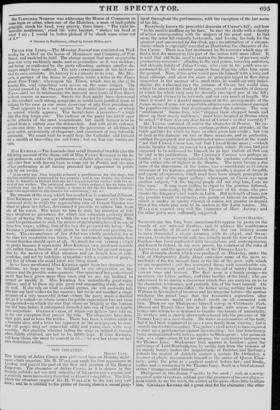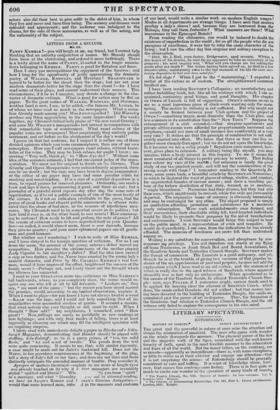THE THEATRES.
DRURY LANE. THE tragedy of Julius Ccesar was performed here on Monday night ; upon which occasion, Mr. H. WALLACK made his first appearance in London, and played the part of the first and greatest of the Roman Emperors. The character of Julius C(4>sar, as it is drawn in this tragedy, exhibits not one trait indicative of SHAKSPEARE'S genius, and is scarcely more interesting, than that of Randers stepfather. The little which the situation required Mr. H. WALLACK to do, was very well done; and he is entitled to the praise of having shown a sound judg, ment throughout the performance, with the exception of the last scene of his life.
Everybody knows the proverbial decorum of Caesar's fall ; and how " in his mantle muffling up his face," he met his death with a dignity of action corresponding with the majesty of his great soul. In this scene the actor fell violently beckwards, and leaving his body for the greatest part uncovered by his cloak, gave no intimation of a circum- stance which is especially recorded as illustrating the character of Ju-
lius Csar. There is a fact mentioned by SUETONIUS which may af- ford a hint for managing this part of the action with more effect. It is Said that old Sylla used to caution the Senators, "utpuerum mule precinclum eaverent ;" alluding to the vast genius, towering ambition, and slovenly habits of Julius Cesar, who even in his youth was ac- customed to let his exterior garment hang dragging after him upon the ground. Now, if the actor would provide himself with a long and large chlamys, and allow the siaus or principal lappet to flow down somewhat in the manner of a small train, he would not only indivi- dualize (to a classical eye) the costume of C'esar, but would also, whilst he observed the truth of history, provide a quantity of drapery in which the whole body may be decently enveloped just at the fall ; which ought always to be forwards, and not very much at length. We think it would be a decided improvement in the arrangements of the forum scene, if some few respectable citizens were introduced amongst the popellus tunicatas that congregate about the rostrum. The very "rabblement" themselves, who " clapped their chopped hands and threw up their sweaty nightcaps," must have laughed at Brutus when he asked "if there was any clear friend of Cahar's in that assembly !"
Mr. YOUNG sustained of course the character of Brutus. He ex- hibited in his action, expression, carriage, gesture, and attitudes, all the noble qualities for which we have so often given him credit ; but was at fault in the dialogue on two or three occasions, and in particular, omitted the pregnant and well-contrasted sense contained in the words " not that I loved Onsar less, but that I loved Rome more ;"—which words, besides being an answer to a question which Brutus had just supposed to be addressed to himself, do in fact include all that can be said in his justification. Mr. COOPER'S Cassius was perhaps in- tended, as it was certainly calculated, for the exclusive entertainment of the critics who sit highest in the theatre._ The actor having a due sense of the dimensions of the house, was so considerate as to infuse into some of his features, particularly the mouth, a degree of breadth, and vigour of expression, which must have been clearly perceptible in the back seat of the upper gallery : whereupon, as Casca says upon another subject, "if the tag-rag-people did not clap him, I am no true man." It may seem trifling to object to the practice followed, we believe universally, by the Julius Chesars of the stage, who pro- nounce the Emperor's last words in Latin. But no length of time, nor any possible weight of authority, can justify so hideous an absurdity, which is ranker in quality (though of course not greater in degree) than if the whole play were to be spoken in the Latin tongue. Mr. Waaeacx enacted Very well the character of Marc Antony ; and the other parts were sufficiently supported.
COVENT GARDEN. SHAKSPEARE has long been accustomed to appear by proxy on the boards of our national theatres, and to address his countrymen by the mouths of Hamlet and Othello ; but our idolatry seems to have demanded a closer intimacy with its object, and SHAK- SPEARE, in obedience to the call, has actually made his bow at Covent Garden—has been confronted with his relations and contemporaries, and forced to defend, in his own person, his violation of .the rules of ARISTOTLE and the manorial rights of Sir THOMAS Lucy.
The dramatic sketch which was produced on Thursday, under the title of Shakspeare's Early Days, embodies some of the more re- markable of the few meagre facts in the life of the poet, with which we are acquainted ; and has connected these, with considerable vio- lence to chronology and hood taste, by the aid of sundry fictions of various hues and texture. The first scene is a family group,—its members, the father, mother, and elder brother of the bard ; who are introduced to us during a discussion which they are carrying on as to the character, tendencies, and probable fate of the bard himself. On these points, the parents differ ; the father seeing nothing but ruin to William in his neglect of business and his irregular habits—the mother indulging the proud hope that her favourite's aspirations after poetical honours might yet reflect credit on all connected with him. Then we see Shakspeare himself asleep in Charlecote Park. Oberon and Titania bless him in his dreams with visions of those beings into whom he is destined to breathe the breath of immortality. He awakes, and is shortly afterwards ushered into the presence of Sir Thomas Lucy as a deer-stealer. He states in extenuation of his fault, that it had been committed to save a poor family from starving; but is smartly fined notwii listanding. The justice's clerk (elect) is then required to draw up a proclamation against deer-stealing ; but that functionary being unacquainted with letters, applies to Shakspeare ; who palms on him, as a composition fit for his purpose, the well-known lampoon on Sir Thomas Lucy. Shakspeare then appears in London ; gains the patronage of Lord Southampton, by saving him from the violence of an unruly horse; makes the acquaintance of Tarleton and Burbage ; defends his neglect of Aristotle against a certain Dr. Orthodox, a licenser of plays; recommends himself to the notice of Queen Eliza- beth; gains the prize in a poetical contest before her ; and finally, baffles and is reconciled to Sir Thomas Lucy. Such is a brief abstract of this " strange eventful history." Shakspeare in this drama "speaks by the card ;" and, in a newly- acquired spirit of egotism, seldom quits the precincts of his own plays,— from which, to say the truth, the author of the piece offers little to allure him, CHARLES kEmBLE did a great deal for the character : the other actors also did their best to give eciat to the deb61 of him, in whom they live and move and have their being. The scenery and dresses were splendid and appropriate ; and the audience was indulgent to the drama, for the sake of these accesiaries, as well as of the acting, and the nationality of the subject.



















 Previous page
Previous page